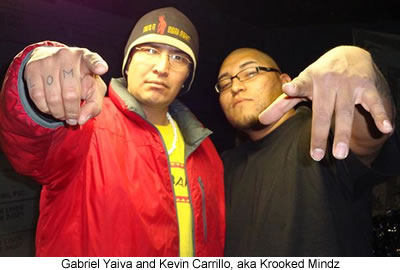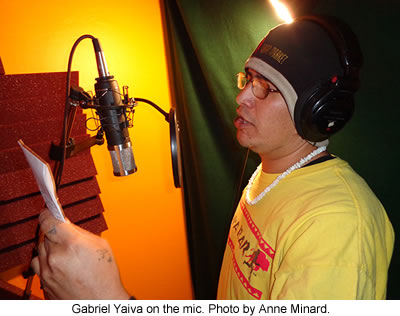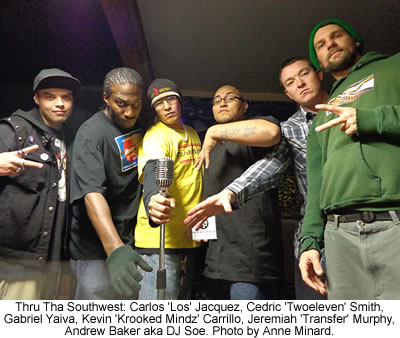 |
Canku Ota
|
 |
|
(Many Paths)
|
||
|
An Online Newsletter
Celebrating Native America
|
||
|
April 2013 - Volume
11 Number 4
|
||
|
|
||
|
Native Hip Hop Artists
Come Together for 'Thru Tha Southwest'
|
||
|
by Anne Minard - Indian
Country Today Media Network
|
||
|
Carrillo, who goes by the stage name "Krook" or Krooked Mindz, got the idea during his recovery that he could invite regional hip-hop artists to contribute tracks to a compilation. He brainstormed the title Thru Tha Southwest, and he decided it would provide a shot in the arm to a genre that has struggled lately due to a lack of local exposure. "There's really not much of a hip hop scene out there. I'd like to revive that," Carrillo said. "The artists need to be filled full of creativity again." Around the same time Gabriel Yaiva, Navajo/Hopi, was developing his own project proposal for a musical outreach effort that would target at-risk youth, especially indigenous kids. Yaiva is an accomplished hip-hop artist too, and he also escaped dark years where he fell into gang violence, alcohol and drug abuse. But he has additional background in the business side of music – and eight years of work in his own nonprofit organization, the Flagstaff-based Peace and Balance Project. Carrillo and Yaiva had long known about each other, but only in passing; Carrillo looked up to Yaiva as an artist who had put a CD in stores when Carrillo was still getting started. Their paths crossed in a more meaningful way late last year, when they got the idea to combine their projects. Now, the two have become the founding members of an upstart hip-hop collaboration. A diverse co-op of artists, including Natives, Mexicans, African Americans and Caucasians, are working to produce Thru Tha Southwest. The CD will be released by this summer and will feature peer-selected tracks from 20 contenders. But Carrillo, Yaiva and the handful of musicians who are throwing their resources into the idea see it as something bigger. In addition to showcasing regional talent, they're angling to build a vibrant scene that will act as a magnet for younger rappers – and help them avoid the rocky roads that many of the participants have escaped. Back From the Brink At one of his lowest points, he lived with other addicts in the home of an ex-pimp and ex-con in Phoenix whose main contribution to Carrillo's life was to "educate me on more of a higher street-level game." At other times he lived out of his car or was truly homeless, occasionally checking into motels to record music on his portable studio, which consisted mainly of a large-screen Mac computer that he lugged with him everywhere he went. Through it all, Carrillo believed in "keeping everything I'm recording true down to the deepest detail," which included the fact that he was always under the influence of drugs or alcohol. One of the tracks he's submitted to the Thru Tha Southwest compilation is called "Am I Slippin'." It's both gripping and true to form:
Carrillo's game almost came to an abrupt stop in May of last year, on a night when he was drinking and using meth in a motel with some friends. During an argument, one of his closest friends pulled a knife and slashed Carrillo nearly to death; the attacker is serving a prison term now.
Despite it all, he said, "My spirit was strong. I didn't want to be a victim. I made a crazy quick recovery, and I jumped back into music." He also jumped into a cleaner lifestyle – he doesn't drink, snort cocaine or use meth any more, he says – and he rejoined his family. He reads the Bible daily and dreams of becoming a pastor. But he struggles with what to write about, and he recognizes that darkness still infiltrates his lyrics. "It's a battle that I have within my own self," he says. Fuel for the Fire "I am a bleeding heart," he said. "When I see injustice in the world, I don't want to feel powerless over it. I feel I have not just the right, but I have the responsibility to stand up and say something." But in his forthcoming fourth album, Murphy's Law, the lyrics reveal a push-pull between exposing those injustices, and rising above them. In "Long Kiss Goodnight," a song he's hoping to place on the Thru Tha Southwest tracklist, he raps: Murphy says he sees a sharp division in his genre that he recognizes even in the set of songs that have been submitted for the compilation: "It's basically divided down the middle, people who look at hip hop as more of an art form, a positive reinforcement – and then there's rap, which is more of the darker side, the street," he says. "It's drug dealing, it's prostitution, pimpery and all this stuff I don't necessarily agree with, but it's a reality. So I can't shun it. But at the same time if our goal is to help the children, especially at-risk youth, escape the dangers of life or the pitfalls of life or whatever, I also feel like it's our responsibility to give them something beautiful, that can give them hope. Not just something that reinforces the shady side."
Yaiva knew going into Thru Tha Southwest that he'd be dealing with a somewhat volatile crowd. But musically speaking, the rivalries can be a good thing. "Competition is the essence of hip hop," he said, taking a break from a studio session with fellow artists Murphy, Carrillo, Cedric "Twoeleven" Smith and Carlos "Los" Jacquez. "In what we're doing right now, the posse cut, each emcee is trying to outdo everybody else that's on that track, and trying to be the best emcee." And as for the varying opinions about lyrical content, Yaiva says he sees a lot of room to move. "I've not censored very many people," he says. "As long as somebody is telling a story or expressing something in a creative way, then I think it's healthy to express that." Greater Good Cedric Smith is another project participant who once fell on dark times. But he remembers people and programs that provided brief oases during his youth – times when he was offered opportunities to learn, grow and be part of something productive. He recalls celebrations put on by the local multi-agency gang task force, where teens could bring their cars for contests of the loudest stereo systems, play three-on-three basketball or show off their bikes. At one point, some locals started a bike club. "It was helping us find a hobby in ourselves and have a great time but also learn how to raise money with car washes and stuff," he said, adding that he and other kids even got to go to Disneyland. "When it kind of fell apart … some of the kids started hanging out with the wrong crowds and getting into trouble."
Now, Smith hopes he and the other participants in the Thru Tha Southwest collaboration can give to today’s youth what was given, albeit intermittently, to him. “I’m hoping a building will come that’s not a bar, so kids 20 and under can come too,” he said. “Give them something to do, dance and have fun. I know not every kid will be all into hip hop or dancing or go to those places, but we could start resources that would help us talk to kids about what they would like to do, and help them grow.” James Gallardo, Choctaw/Mexican/African American, isn’t contributing music to the album, but he’s making art for the cover. His main interest in the project is that he comes from several generations of a family that has created an infrastructure of support for youth in Flagstaff. His grandmother, Katherine Hickman, 91, was instrumental in creating the Murdoch Center, a preschool in one of Flagstaff’s hardest neighborhoods, in the 1960s. Gallardo feels a responsibility to pick up the ball, and he sees the Thru Tha Southwest venture as an ideal fit – especially when it comes to the outreach ambitions. As for the kids in his community who are falling into drugs and gangs, “they’re broken,” he says. “They think the system is bringing them down. They haven’t been excluded. They’ve excluded themselves. I have to heal that somehow.” Gallardo wants a chance to try to educate them, build their confidence, and show them a way out. And he agrees that outreach through the hip-hop collaboration is a fine place to start. He also feels a spiritual connection to the collaborative; it aligns with his view that people are on an evolutionary path toward a state where “love is the basis of everything we do.” Ryan “O’Rion” Francher, Navajo, one of the youngest contributors to the collaboration, says he’s been inspired already by the group’s energy and ideas, as he’s participated in the meetings and shared studio time with the other artists. “When I do it, I feel like O’Rion,” he said. “I feel a different part of me.” Despite their occasional differences, none of the participants have any doubt that the project is going to work. That faith may be the strongest thing that unites them. "The best thing about it," Carrillo said, "is everybody believes in it." |
|
|
||
|
|
||
| Canku Ota is a free Newsletter celebrating Native America, its traditions and accomplishments . We do not provide subscriber or visitor names to anyone. Some articles presented in Canku Ota may contain copyright material. We have received appropriate permissions for republishing any articles. Material appearing here is distributed without profit or monetary gain to those who have expressed an interest. This is in accordance with Title 17 U.S.C. Section 107. | ||
|
Canku Ota is a copyright ©
2000 - 2013 of Vicki Williams Barry and Paul Barry.
|
||
 |
 |
|
|
The "Canku
Ota - A Newsletter Celebrating Native America" web site and
its design is the
|
||
|
Copyright ©
1999 - 2013 of Paul C. Barry.
|
||
|
All Rights Reserved.
|
||
 Kevin
Carrillo, a Hopi/Comanche hip-hop artist, knew his life had to change
after he was nearly killed in a drunken knife attack last year.
But in an ironic twist, the very vehicle that he rode to such depths
– his music – is helping him, and potentially others,
to forge a healthier path.
Kevin
Carrillo, a Hopi/Comanche hip-hop artist, knew his life had to change
after he was nearly killed in a drunken knife attack last year.
But in an ironic twist, the very vehicle that he rode to such depths
– his music – is helping him, and potentially others,
to forge a healthier path. Carrillo
says he flatlined twice, once in the ambulance and once at the hospital.
His left lung collapsed, and he lost 13 inches of his intestine.
He required 12 bags of blood to survive the night, and he stayed
in intensive care for nine days.
Carrillo
says he flatlined twice, once in the ambulance and once at the hospital.
His left lung collapsed, and he lost 13 inches of his intestine.
He required 12 bags of blood to survive the night, and he stayed
in intensive care for nine days. That
tension – between darkness and light in the lyrics – is
just one of several that seem to be both challenging and fueling
the new collaboration. Carrillo had to put aside a heated rivalry
in order to work with one of the musicians; Murphy was tempted to
walk away from the project because another collaborator verbally
attacked him in public.
That
tension – between darkness and light in the lyrics – is
just one of several that seem to be both challenging and fueling
the new collaboration. Carrillo had to put aside a heated rivalry
in order to work with one of the musicians; Murphy was tempted to
walk away from the project because another collaborator verbally
attacked him in public.